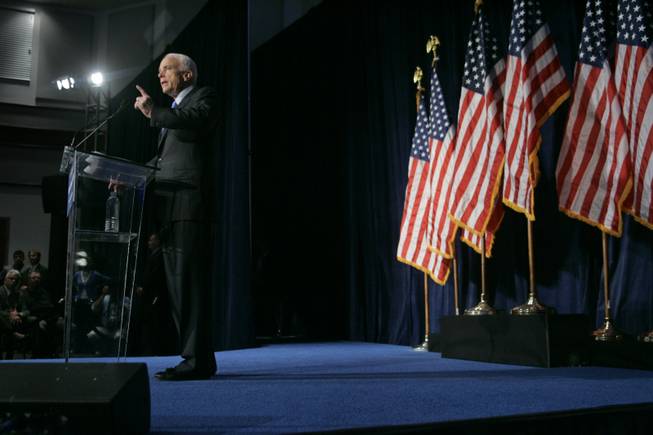
Republican presidential candidate Sen. John McCain speaks on energy policy during a campaign visit to UNLV on Wednesday. McCain advocates more domestic drilling.
Sunday, June 29, 2008 | 2 a.m.
A few weeks ago, state Sen. Dina Titus stood at a gas station and blamed high gas prices on Rep. Jon Porter, whom she’s challenging in the Third Congressional District.
Titus, a Democrat, said Porter had time and again gone along with Bush administration policies that help Big Oil and hurt consumers. She also raised the issue last week in the state Senate, proposing a gas tax holiday, even though economists don’t think such a move would help the situation at all.
Republicans have also gotten into the act, pointing to failed promises by Democrats to address gas prices during the 2006 election.
Here’s what voters need to know about the price of gasoline: Elected officials are better equipped to reduce Earth’s gravitational pull than they are to reduce gas prices. The laws of first-year college economics apply here.
“Anybody who says they can get the price of oil down next year, they don’t know what they’re talking about,” UNLV economist Bill Robinson said.
The rapid growth of the Indian and Chinese economies, which means more cars and thus the need for more oil, has driven up demand. Meanwhile, oil producing countries, most of which are members of a price-fixing cartel, can’t produce much more than they do.
Demand up, supply the same, higher price. There’s no getting around this.
Moreover, the slackening dollar is adding to the upward pressure. When the dollar was strong, foreigners bought it because it was considered a safe investment. Now investors are turning to oil futures.
Politicians refer to this wholly rational behavior as “speculation” and often pretend they can do something about it.
But oil is traded on international markets and can’t be controlled by American regulators.
Drilling in the Arctic National Wildlife Refuge would cut crude oil prices by about 75 cents per barrel by 2025, according to a recent Bush Energy Department report. Oil was trading above $140 last week. So not much help there.
Offshore drilling? That wouldn’t start for three to five years.
Republican nominee Sen. John McCain, who was in Las Vegas last week to promote his energy program, said new drilling would have a “psychological” effect on market players and drive down prices.
Nope.
“There’s no psychological effects in those markets,” Robinson said. And if there is a psychological issue, he said, it’s related to fear of what might happen in the Middle East.
This isn’t to say a rational long-term energy policy isn’t possible and highly desirable, and no doubt it should have been crafted and executed on Sept. 12, 2001.
Both McCain and Democratic nominee Barack Obama, who was also in town last week to talk energy, have some ideas.
McCain would give tax credits for efficient, low-emission vehicles and add to our store of carbon-free nuclear power. (He favors the nuclear dump at Yucca Mountain, assuming it can be proved safe.)
Obama, who in the short term would put cash in middle-class pockets to fill tanks, would invest heavily in solar, wind, geothermal and biomass alternative fuels. (Environmentalists and economists detest his advocacy of corn-based ethanol because it drives up food prices and isn’t energy efficient.)
A smart energy policy is especially important to Nevadans, because we could benefit greatly from a diverse energy menu with our vast stores of wind, solar and geothermal energy. A carbon-free future would also mitigate global warming, which will hit us first, and hit us hard.
Moreover, Nevada is one of the most petrol-dependent places in the country. Las Vegas is dependent on gas to deliver tourists, fresh flowers, liquor, food, everything. We also think public transit is for losers and coastal beatniks.
Carroll Doherty, associate director of the Pew Research Center for the Public and the Press, said gas prices are front and center in voters’ minds. Energy is a top issue for 77 percent of them, compared with 54 percent in 2004. For some, this constitutes a concern about our long-term energy needs, but for many, it means gas prices.
Gas prices over which politicians have no control.

Join the Discussion:
Check this out for a full explanation of our conversion to the LiveFyre commenting system and instructions on how to sign up for an account.
Full comments policy